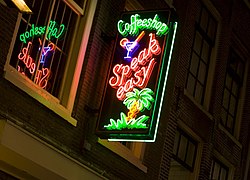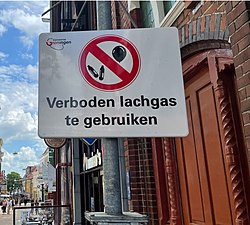
Back سياسة المخدرات الهولندية Arabic Niederländische Drogenpolitik German Política sobre drogas en los Países Bajos Spanish Drogue aux Pays-Bas French Թմրամիջոցների քաղաքականությունը Նիդերլանդներում HY Kebijakan obat di Belanda ID Politica dei Paesi Bassi in materia di stupefacenti Italian オランダの薬物政策 Japanese Drugsbeleid in Nederland Dutch Holenderska polityka wobec narkotyków Polish
This article needs to be updated. (January 2016) |
| Part of a series on |
| Cannabis |
|---|
 |



While recreational use, possession and trade of non-medicinal drugs described by the Opium Law are all technically illegal under Dutch law, official policy since the late 20th century has been to openly tolerate all recreational use while tolerating possession and trade under certain circumstances. This pragmatic approach was motivated by the idea that a drug-free Dutch society is unrealistic and unattainable, and efforts would be better spent trying to minimize harm caused by recreational drug use.[1] As a result of this gedoogbeleid (lit. "tolerance policy" or "policy of tolerance"), the Netherlands is typically seen as much more tolerant of drugs than most other countries.[2]
Legal distinctions are made in the Opium Law between drugs with a low risk of harm and/or addiction, called 'soft drugs', and drugs with a high risk of harm and/or addiction, called 'hard drugs'. Soft drugs include hash, marijuana, sleeping pills and sedatives, while hard drugs include heroin, cocaine, amphetamine, LSD and ecstasy. Policy has been to largely tolerate the sale of soft drugs while strongly suppressing the sale, circulation and use of hard drugs, effectively separating it into two markets. Establishments that have been permitted to sell soft drugs under certain circumstances are called coffee shops.[3] Laws established in January 2013 required visitors of coffee shops to be Dutch residents, but these laws were only applied in Zeeland, North Brabant and Limburg after much local criticism.[4][5] Possession of a soft drug for personal use in quantities below a certain threshold (5 grams of cannabis or 5 cannabis plants) is tolerated, but larger quantities or possession of hard drugs may lead to prosecution. Prosecution for possession, trade and (in some rare cases) use are typically handled by the municipal government except where large-scale criminal activity is suspected.[6][7]
Notably absent from toleration of drugs is its production, particularly the cultivation of cannabis. This has led to a seemingly paradoxical system where coffee shops are allowed to buy and sell soft drugs but where production is nearly always punished.[7] Because coffee shops have to get their goods from somewhere, criticism has been raised over the years against continued prosecution of soft drug producers. It was first challenged in court in 2014 when a judge found two people guilty of producing cannabis in large quantities but refused to punish them.[8][9] A significant change occurred in early 2017, when a slight majority in the House of Representatives allowed for a law to pass that would partly legalize production of cannabis.[10] In late 2017, the newly formed coalition announced that they would seek to implement an experimental pilot program in smaller cities where coffee shops could acquire cannabis from a state-appointed producer.[11] The program went into effect in two cities - Breda and Tilburg - in December 2023.[12]
While the legalization of cannabis remains controversial, the introduction of heroin-assisted treatment in 1998 has been lauded for considerably improving the health and social situation of opiate-dependent patients in the Netherlands.[13]
- ^ Drugs en Beleid Archived 6 December 2019 at the Wayback Machine ("Drugs and Policy"), Trimbos instituut
- ^ Amsterdam for tourists: What's legal? Archived 22 March 2021 at the Wayback Machine, CNN Travel
- ^ Toleration policy regarding soft drugs and coffee shops Archived 7 February 2021 at the Wayback Machine, Ministry of Security and Justice
- ^ Weed pass sparks new problems Archived 2012-10-20 at the Wayback Machine. rnw.nl. 2012-05-09.
- ^ "Amsterdam ditches controversial 'weed pass' law". Daily News. New York. 21 November 2012. Archived from the original on 12 May 2021. Retrieved 12 August 2013.
- ^ Drugsbezit en drugshandel Archived 2 June 2023 at the Wayback Machine (Possession and trade of drugs), Wet & Recht
- ^ a b Am I committing a criminal offence if I possess, produce or deal in drugs? Archived 2 June 2023 at the Wayback Machine, Ministry of Security and Justice
- ^ "Rechter volgt wietparadox ("Judge follows weed paradox"), NRC". Archived from the original on 15 August 2022. Retrieved 17 October 2017.
- ^ Wiet - de rechter is er wel klaar mee Archived 27 June 2022 at the Wayback Machine ,"Weed - judges are quite done with it", NRC
- ^ Tweede Kamer steunt regulering wietteelt Archived 17 January 2022 at the Wayback Machine, ("House of Representatives supports regulating weed cultivation"), NOS
- ^ Nieuw kabinet staat proef met legale wietteelt toe ("New cabinet allows experiment with legal weed cultivation") Archived 18 October 2017 at the Wayback Machine, RTL News
- ^ "Legal cannabis available in Tilburg, Breda as regulation experiment starts," The NL Times, 15 December 2023, retrieved from https://nltimes.nl/2023/12/15/legal-cannabis-available-tilburg-breda-regulation-experiment-starts
- ^ Fischer, Benedikt; Oviedo-Joekes, Eugenia; Blanken, Peter; Haasen, Christian; Rehm, Jürgen; Schechter, Martin T.; Strang, John; Van Den Brink, Wim (July 2007). "Heroin-assisted Treatment (HAT) a Decade Later: A Brief Update on Science and Politics". J Urban Health. 84 (4): 552–62. doi:10.1007/s11524-007-9198-y. PMC 2219559. PMID 17562183.